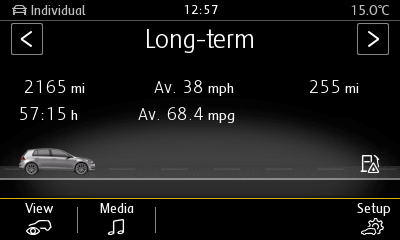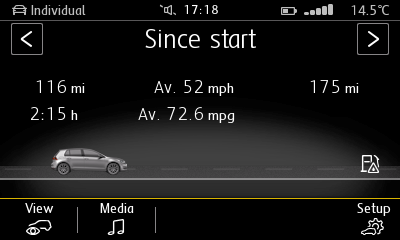Premium Diesel
15th May 2017
Whilst I was learning about the Diesel Particulate Filter (DPF) fitted to my Golf Mk 7 with 1.6 TDI engine, it was suggested to me that using premium diesel might reduce how often the DPF would require regenerating. It was also suggested that using premium diesel might also prevent an apparently common problem with cars which use Exhaust Gas Recirculation (EGR) of the engine's inlet manifold becoming clogged with soot. Finally there is the common belief that the engine would run more smoothly and be more economical when run on premium diesel. I wasn't sure about any of these claims. I was pretty sure that how a vehicle is used would have a much greater impact on the health and efficiency of the engine rather than the fuel was used. However I had no evidence to support this so I decided to investigate.
Testing
I had owned my Mk 7 for approximately 6 months before I started my investigation. By this point I was used to the car and was using it for my typical journeys, these being typically relatively long journeys of at least an hour, mainly cruising at around 57 MPH and with little stop-start driving. The first step was to determine how frequently the DPF was being regenerated whilst running on supermarket diesel. Using VCDS I was able to determine quite accurately that regeneration was occurring approximately every 260 miles. The car's long term trip computer told me that I had been averaging approximately 67 MPG.
I then filled up with a premium diesel (BP Ultimate) and continued my usual journeys for approximately 6 weeks during which time I covered approximately 2,000 miles. This required two further top-ups of BP Ultimate Diesel. I continued to monitor DPF regeneration either using VCDS or via the Infotainment System.
Conclusion?
Pretty much zero difference.
When I tried premium diesel in my previous car, my Golf Mk 5 with 1.9 PD TDI engine a few years ago, I did notice a slight improvement in engine refinement and smoothness. However with the Mk 7's 1.6 CR engine, it is already so refined and smooth that even if it is even more so whilst running on premium diesel, it is not apparent to the driver, especially a driver like me with my relatively sedate driving style.

Trip computer showing long-term average fuel consumption using supermarket diesel.
During my experiment there did appear to be a very slight improvement to the car's long term fuel consumption by approximately 1 MPG. However I am not convinced this was down to the change in fuel. More specifically I believe this could be more likely attributed to:
- A slight increase in ambient air temperatures as my premium diesel observation occurred during mid March/April compared with my standard diesel observation occurring in January & February.
- I used a full tank of premium diesel in one week mid April during a series of longer cruises which can be expected to have resulted in better fuel consumption.
Also you have to take into account that premium diesel costs more than standard diesel. During my experiment BP Ultimate Diesel cost about 14p/litre more than supermarket diesel. On a full tank that equates to approximately £7 extra/tank.
I was unable to assess if using premium diesel would lead to less problems with soot build-up in the inlet manifold due to EGR. However my experience with my Golf Mk 5 which also used EGR and never had any problems over the 172,000 miles I had it strengthens my belief that it is more a matter of how you use your car which affects this rather than which fuel you use.
Fuel Consumption
Whilst evaluating premium diesel I became much more familiar with the fuel economy of my Golf Mk 7 with 1.6 TDI engine. It's pretty amazing.
A lot of my driving is typically cruising around at 57 MPH on motorways and unrestricted country roads. I rarely use my car for short journeys and can usually avoid most traffic jams and rush hours. Also it's usually just me in the car and I like to keep it tidy inside so I don't lug around much extra weight. This means I can usually average around 67 MPG using supermarket diesel.
One week mid April I drove around 700 miles, mainly on motorways at 70 MPH with a passenger. I was interested to see how the increased speed would affect my MPG. I needn't have worried. Whilst the extra weight and increased wind resistance at 70 MPH compared with 56 MPH would undoubted have reduced fuel efficiency, the longer journeys gave the engine longer to average out the cold-start inefficiencies.

Trip computer showing average fuel consumption since refuelling with premium diesel
over 521 miles ago after mainly faster journeys with a passenger.

Trip computer showing average fuel consumption since start of a single 116 mile journey
mainly at 70 MPH with a passenger, using premium diesel.
On one 116 mile, mainly 70 MPH journey the car still averaged 72.6 MPG. Amazing.